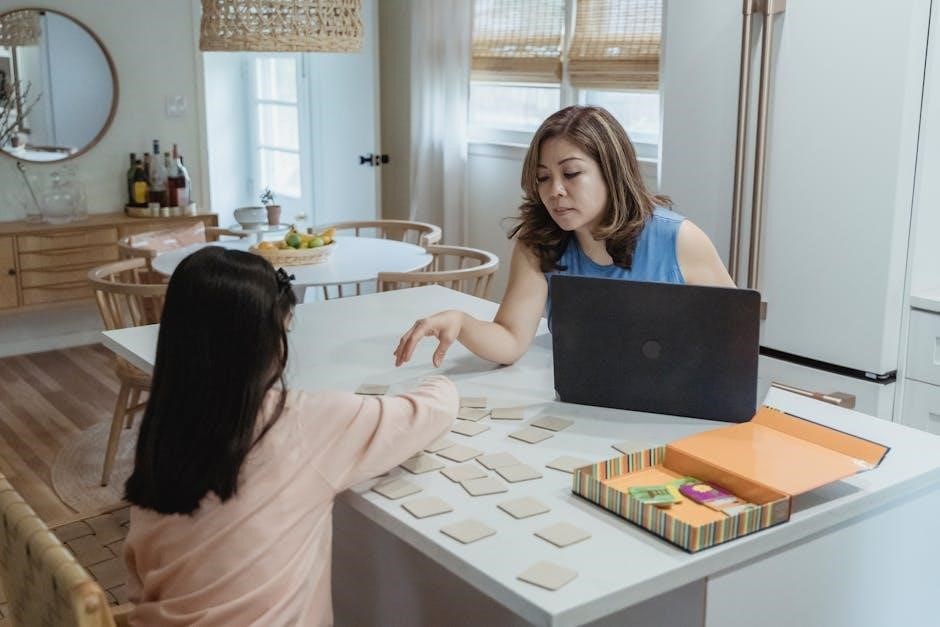Parent education empowers caregivers with skills and knowledge to support child development․ It combines group and individual approaches, fostering collaboration and personalized growth, ultimately strengthening family and child well-being․
Definition and Importance of Parent Education
Parent education refers to intentional learning opportunities designed to enhance caregivers’ skills, knowledge, and confidence in supporting their children’s development․ It is a vital tool for fostering positive parent-child relationships, improving communication, and addressing challenges in child-rearing․ The importance lies in its ability to empower parents with evidence-based strategies, promoting emotional, social, and academic growth in children․ By addressing diverse family needs, parent education helps create supportive environments that encourage lifelong learning and resilience․ It also plays a critical role in bridging gaps between home and school, ensuring consistency in a child’s educational journey․ Effective parent education programs emphasize accountability, providing measurable outcomes that benefit both families and communities․ Ultimately, it serves as a foundation for equipping parents with the tools necessary to navigate modern parenting challenges effectively․

Historical Evolution of Parent Education Programs
Parent education has evolved significantly over the decades, transitioning from informal community-based initiatives to structured, evidence-based programs․ Early efforts in the 20th century focused on improving home environments through parent-teacher associations and home economics movements․ The 1960s and 1970s saw the rise of group-based parent education, emphasizing child development and parenting skills․ Programs like the Incredible Years and Parent-Child Interaction Therapy gained prominence, incorporating research-based practices․ The 21st century introduced hybrid models, blending group and individual approaches to address diverse family needs․ This shift reflected growing recognition of the complexity of parenting challenges and the importance of tailored support․ Historical developments highlight the adaptability of parent education, aligning with societal changes and advancing understanding of child and family well-being․ Today, parent education continues to innovate, integrating technology and community partnerships to enhance accessibility and effectiveness․
Key Objectives of Parent Education
Parent education aims to empower caregivers with the knowledge, skills, and confidence to support their children’s development effectively․ Its primary objectives include fostering positive parent-child relationships, promoting healthy child development, and enhancing parents’ ability to navigate challenges․ Programs also focus on improving communication, discipline, and problem-solving skills․ Additionally, parent education seeks to strengthen family engagement in education, encouraging collaboration between parents and schools․ It emphasizes building resilience, addressing diverse family needs, and creating supportive learning environments․ By achieving these goals, parent education contributes to the overall well-being of children and families, fostering a nurturing and equitable environment for all․ These objectives are central to the design and delivery of both group and individual parent education initiatives, ensuring a comprehensive approach to supporting parents in their vital role․ The ultimate aim is to equip parents with the tools needed to raise capable, confident, and compassionate individuals․

Working with Parent Groups
Parent education focuses on fostering collaboration and mutual support among caregivers․ Group settings encourage shared learning, addressing diverse needs, and creating a collective environment for growth and empowerment․
Designing Educational Content for Group Parent Education
Designing effective educational content for group parent education involves tailoring materials to meet diverse learning needs․ It requires a deep understanding of the audience’s challenges and goals․ Incorporating interactive activities, real-life scenarios, and practical strategies ensures engagement and applicability․ Content should be structured to promote active participation, fostering a supportive environment where parents can share experiences and learn from one another․ Additionally, integrating evidence-based practices and current research ensures the information is relevant and actionable․ Clear objectives and measurable outcomes guide the development process, ensuring that the content addresses key aspects of parenting, such as communication, discipline, and child development․ Regular feedback from participants helps refine the content, making it more effective and responsive to their needs․ Ultimately, well-designed content empowers parents with the tools and confidence to support their children’s growth effectively․
Facilitation Skills for Leading Parent Groups
Effective facilitation skills are essential for leading parent groups, ensuring engaging and productive sessions․ Key skills include active listening, empathy, and the ability to create a safe, inclusive environment․ Facilitators must encourage open dialogue, manage diverse perspectives, and guide discussions to meet learning objectives․ Techniques like asking open-ended questions, using non-verbal cues, and summarizing key points help maintain focus and participation․ Additionally, facilitators should be adept at addressing challenging behaviors and fostering collaboration among group members․ Building rapport and establishing trust are crucial for creating a supportive atmosphere where parents feel comfortable sharing experiences and learning from one another․ Continuous improvement through self-reflection and feedback enhances facilitation effectiveness, ensuring that parent groups achieve their intended outcomes and foster meaningful growth for participants․

Managing Difficult Moments in Parent Groups
Managing difficult moments in parent groups requires a combination of empathy, active listening, and strategic intervention․ Facilitators should remain calm and composed, addressing conflicts or disruptive behaviors promptly․ Techniques like redirecting the conversation or setting clear expectations can help maintain focus․ Encouraging respectful communication and fostering an inclusive environment are key to resolving tensions․ Additionally, recognizing and validating emotions can prevent escalation․ Facilitators should also be prepared to handle challenging behaviors, such as dominance by a few individuals or resistance to new ideas․ By staying attuned to group dynamics and using non-verbal cues, facilitators can guide the discussion back to constructive dialogue․ Effective management of difficult moments not only preserves group cohesion but also builds trust, ensuring that all participants feel heard and supported․
Promoting Accountability in Group Parent Education
Promoting accountability in group parent education involves fostering a culture of responsibility and engagement․ Clear goal-setting and regular progress checks help participants stay committed․ Facilitators should encourage open discussions about challenges and successes, creating a supportive environment where parents feel motivated to apply what they learn․ Providing actionable strategies and resources empowers parents to take ownership of their development․ Additionally, celebrating milestones and offering constructive feedback reinforces accountability․ By emphasizing the importance of active participation and follow-through, facilitators can ensure that parents remain dedicated to improving their skills and contributing positively to the group dynamic․ This approach not only enhances individual growth but also strengthens collective efforts, leading to more effective outcomes for both parents and their children․

Working with Individuals
Working with individuals in parent education allows for personalized support, addressing unique needs and circumstances․ This approach fosters strong parent-educator relationships, enabling tailored strategies for effective parenting and child development․
Understanding Individual Learning Needs in Parent Education
Understanding individual learning needs in parent education ensures personalized support․ Each parent’s unique circumstances, such as cultural background, education level, and personal experiences, influence their learning approach․ Assessing these needs helps educators tailor strategies to enhance effectiveness․ For example, some parents may benefit from hands-on activities, while others prefer structured guidance․ Recognizing these differences allows for targeted interventions, fostering a supportive environment where parents can thrive․ This personalized approach not only addresses specific challenges but also empowers parents to apply what they learn effectively․ By acknowledging and adapting to individual learning needs, parent educators can create meaningful, impactful experiences that promote positive parenting practices and improve child outcomes․
Personalized Strategies for Individual Parent Support
Personalized strategies for individual parent support focus on tailoring approaches to meet the unique needs and circumstances of each parent․ This involves understanding their specific challenges, goals, and learning styles․ Effective strategies include setting clear, achievable goals, providing one-on-one guidance, and incorporating active listening to address concerns․ Additionally, leveraging cultural sensitivity and adapting content to the parent’s background ensures relevance and engagement․ Offering flexible learning opportunities, such as individualized action plans or resource sharing, empowers parents to apply strategies in their daily lives․ Regular follow-ups and feedback loops help track progress and adjust support as needed․ By prioritizing individualized attention, parent educators can foster a sense of trust and empowerment, enabling parents to effectively support their children’s development and well-being․ This personalized approach ensures that no parent is left behind, regardless of their unique situation or learning preferences․
Building Strong Parent-Educator Relationships
Building strong parent-educator relationships is foundational to effective parent education․ These relationships are built on trust, mutual respect, and open communication․ Educators should strive to create a safe and supportive environment where parents feel comfortable sharing their concerns and goals․ Active listening, empathy, and cultural sensitivity are essential in fostering these connections․ Regular interactions, such as one-on-one meetings or small group discussions, help establish rapport and ensure that parents feel heard․ Collaborative goal-setting and shared decision-making further strengthen these relationships, as parents are empowered to take an active role in their children’s education․ By maintaining consistent and positive interactions, educators can create a partnership that benefits both parents and their children, leading to more effective support and improved educational outcomes․ Strong parent-educator relationships are key to sustaining long-term engagement and fostering a community of mutual support and growth․

Combining Group and Individual Approaches
Combining group and individual approaches in parent education offers a balanced strategy, blending collective learning experiences with personalized support, ensuring diverse needs are met effectively and adaptability is maximized․
Integrating Group and Individual Parent Education Methods
Integrating group and individual parent education methods creates a comprehensive approach to meet diverse needs․ Group sessions foster collaboration, shared experiences, and peer support, while individualized strategies address unique challenges․ This hybrid model allows parent educators to tailor content, ensuring both collective learning and personalized growth․ For instance, group activities can focus on general parenting skills, while one-on-one sessions delve into specific issues like child behavior or family dynamics․ Technology and innovative tools, such as online platforms, can bridge these approaches, offering flexibility and accessibility․ By combining these methods, parent educators create a balanced and adaptive learning environment that enhances overall effectiveness․ This integrated strategy not only strengthens parent-child relationships but also empowers caregivers with practical skills and confidence, leading to improved outcomes for families and children․
12․Hybrid Models of Parent Education Delivery
Hybrid Models of Parent Education Delivery
Hybrid models of parent education delivery blend traditional in-person sessions with digital tools, offering flexibility and accessibility․ These models combine group workshops with individualized online resources, allowing parents to engage at their convenience․ For example, virtual platforms can host live webinars for group discussions, while personalized modules provide tailored guidance․ This approach caters to diverse learning preferences and schedules, ensuring broader reach and inclusivity․ Hybrid models also facilitate continuous learning, as parents can revisit materials and track progress․ By integrating technology, parent educators enhance engagement and adaptability, making education more accessible for working parents or those with limited mobility․ This innovative delivery method supports sustained growth and fosters stronger connections between educators, parents, and communities, ultimately benefiting child development and family well-being․
Case Studies of Successful Combined Approaches

Case studies highlight the effectiveness of combining group and individual parent education strategies․ For instance, the Incredible Years program, developed by Webster-Stratton, integrates group parent training with individual child-focused interventions․ This approach has shown significant improvements in parent-child interactions and behavior management․ Another example is the Moreland School initiative, where mothers worked alongside teachers during school hours, fostering collaboration and improving student outcomes․ These case studies demonstrate how blending group sessions with personalized support enhances parental engagement and child development․ By leveraging both approaches, educators create a holistic learning environment that addresses diverse needs and strengthens family-school partnerships․ Such successful models provide valuable insights for parent educators, underscoring the importance of adaptable and inclusive strategies in fostering positive outcomes for families and children․

Professional Development for Parent Educators
Professional development for parent educators focuses on continuous learning, skill enhancement, and community collaboration to effectively support parents through group and individual education strategies, fostering child and family well-being․
Continuous Learning Opportunities for Parent Educators
Continuous learning is essential for parent educators to stay updated on effective strategies and research-based practices․ Workshops, seminars, and online courses provide platforms for professional growth․ These opportunities help educators refine their facilitation skills, deepen their understanding of diverse family needs, and adapt to emerging trends in parent education․
Resources like the Parent Education Core Curriculum Framework and programs such as the Incredible Years offer structured learning pathways․ Collaborative learning environments and peer discussions further enhance knowledge sharing and innovation․ By engaging in ongoing education, parent educators can better support families, fostering stronger parent-child relationships and improved educational outcomes for children․
Essential Skills for Effective Parent Education
Effective parent education requires a blend of interpersonal and instructional skills․ Empathy, active listening, and cultural sensitivity are crucial for building trust with diverse families․ Educators must also possess strong communication skills to convey complex concepts clearly․ Facilitation skills, including group management and conflict resolution, ensure productive sessions․ Additionally, problem-solving and adaptability enable educators to address unique challenges and tailor strategies to individual needs․ These skills, combined with a deep understanding of child development and education, empower parent educators to create supportive learning environments․ Continuous refinement of these skills through practice and professional development enhances their effectiveness in fostering positive outcomes for families․
Strengthening Community Partnerships in Parent Education
Building strong community partnerships is vital for effective parent education․ Collaborations with schools, local organizations, and healthcare providers create a supportive network for families․ Partnerships ensure access to resources, expertise, and funding, enhancing program sustainability․ Community involvement fosters trust and cultural relevance, making parent education more accessible․ By engaging stakeholders, educators can address specific community needs, leading to tailored initiatives․ Shared goals and coordinated efforts amplify the impact of parent education, benefiting both families and the community․ Regular communication and mutual respect are key to maintaining these partnerships, ensuring long-term success and positive outcomes for children and families․

Resources and Tools

Recommended literature and frameworks provide essential guidance, while technology tools and innovative platforms enhance accessibility and support in parent education for groups and individuals effectively․
Recommended Literature and Frameworks for Parent Education
Key literature and frameworks guide effective parent education, blending research and practice․ Webster-Stratton’s Incredible Years offers evidence-based strategies for group training, while Deborah Campbell and Glen Palm’s Parent Education: Working with Groups and Individuals provides comprehensive approaches․ Epstein and Salinas’ work on family engagement highlights equitable participation․ These resources emphasize relationship-building, accountability, and adaptability․ Frameworks like the Parent Education Core Curriculum focus on competency development and support for diverse family needs․ They promote collaborative learning environments and practical tools for educators․ These materials are essential for designing impactful programs, ensuring parents gain skills to nurture their children’s growth effectively․
Technology and Innovative Tools in Parent Education
Technology has transformed parent education by providing innovative tools that enhance accessibility and engagement․ Online platforms, such as learning management systems, enable parents to access educational content anytime, fostering flexibility․ Apps like parenting guides and interactive modules offer personalized learning experiences․ Video conferencing tools facilitate virtual group sessions, connecting parents across distances․ Additionally, digital resources such as webinars, podcasts, and e-books provide diverse learning opportunities․ These tools not only improve convenience but also cater to different learning styles, ensuring inclusivity․ Innovations like AI-driven chatbots and adaptive learning platforms further tailor support to individual needs․ By leveraging technology, parent education becomes more dynamic, inclusive, and impactful, equipping parents with practical skills to support their children’s development effectively․
